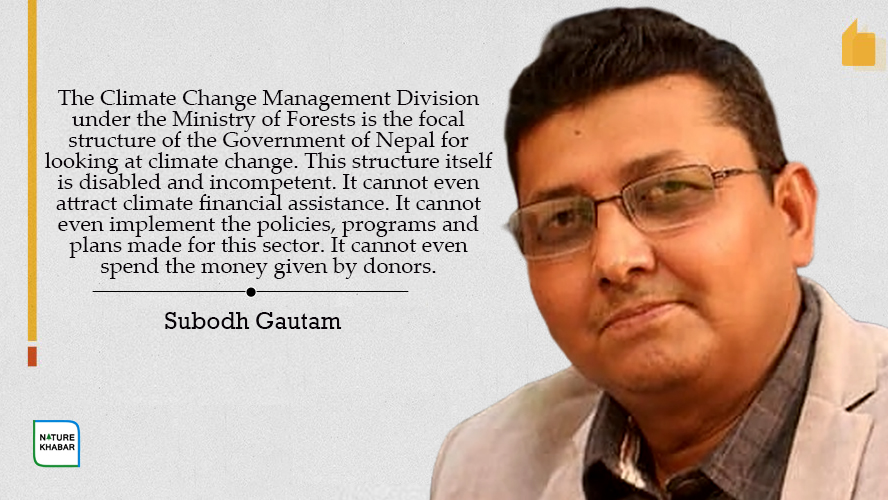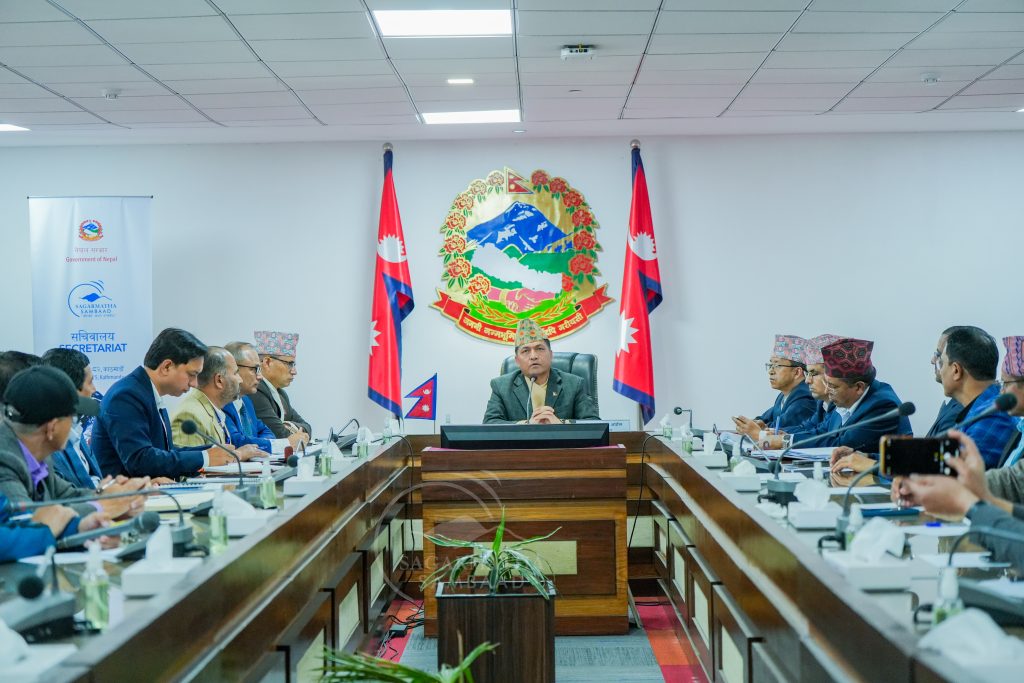No capacity to spend CC grants, always a struggle to go to COP !

The International Conference of the Parties to the United Nations Framework Convention on Climate Change (COP 29) is starting in Baku, Azerbaijan from Monday (today). At this conference held every year, its party countries set their own agendas.
Every year, a jumbo team from Nepal, led by one of the heads of state or executives, goes to participate in this conference. This time too, a jumbo team (more than 50 people) of unrelated and incapable people has reached Baku. President of Nepal, Mr. Ram Chandra Paudel, is leading the Nepali jumbo delegation at this COP.
There is a constant struggle between the political and administrative leadership of the forest to go to the conference. Not only the minister goes, but also his relatives and secretariat employees, as well as employees of unrelated divisions and branches, keep demanding to participate in the conference. This anomaly is not only recent, but has been going on for years.
But nothing is being done to regulate the effects of climate change or create an environment for climate adaptation. No work is ever done to strengthen the institutional structure. Organizational and structural development work is never done. Leadership capacity development work is never done. Those who have always been the focal point of Nepal. Those who have taken the contract to look at climate change have never felt guilty for not being able to do their job. All three have not been able to spend the crores of rupees given by donors to regulate and adapt to the effects of climate change on time. They have sent the donors back. There are many such examples. And all three officials go back to the COP and start crying to the international community that there is not enough money to work. After returning to Nepal, the same 'incompetent' attitude starts again.
 The Climate Change Management Division under the Ministry of Forests is the focal structure of the Government of Nepal for looking at climate change. This structure itself is disabled and incompetent. It cannot even attract climate financial assistance. It cannot even implement the policies, programs and plans made for this sector. It cannot even spend the money given by donors. It has returned the crores of rupees given by donors in the name of various projects related to climate change.
The Climate Change Management Division under the Ministry of Forests is the focal structure of the Government of Nepal for looking at climate change. This structure itself is disabled and incompetent. It cannot even attract climate financial assistance. It cannot even implement the policies, programs and plans made for this sector. It cannot even spend the money given by donors. It has returned the crores of rupees given by donors in the name of various projects related to climate change.
The Climate Change Management Division returned about 600 million rupees of the Nepal Climate Support Program-2 (NCCSP) after it was unable to spend it. This project had been operating since 2013 with the support of the British government. After the completion of the first phase of work, it was working on the second phase after 2019. The amount was returned after the division was unable to complete the second phase of work on time.
Where is this ? The amount of the project operated by the RED Implementation Unit under the Ministry of Forests has also been returned. The World Bank had repeatedly provided about 9 million US dollars in support for reducing emissions through deforestation and degradation, conserving forest carbon stocks, sustainable management of forests, and enhancing carbon stocks. Out of this, about 80 million rupees given as the last installment was not spent, and the World Bank returned it.
Those who have never been able to do promising work under their leadership have come forward to lead various agendas even in the current crisis. Until this distortion and incompetence is eliminated, it does not seem that a country like ours affected by climate change will be saved.
In fact, not only one ministry but the government is almost unsuccessful in spending aid grants. Forest administration is just one part of the government. However, the political and administrative leadership of the forest, which always complains about not being able to go to international conferences and conferences and not being able to work due to lack of money, does not do anything to develop its capacity. Therefore, questions are raised about its capacity in all directions. And, this is natural. How can a political and administrative leadership that cannot spend the crores of rupees received from donors spend billions of rupees? While the United Nations Framework Convention on Climate Change (UNFCCC) estimates that the least developed countries will need 60 billion US dollars annually by 2030 to implement their country's climate action plans. It is not surprising that as long as there is a leadership that is incapable of spending the money after returning to the country and sending it back to donors, the impact of the disasters caused by climate change and the three will be reduced. The effects of the disasters will remain the same and ordinary poor Nepalis will have to deal with such problems every year.
The least developed countries always argue about financial shortages in COPs. Easy availability of climate finance is becoming the main agenda of such countries in every COP. Nepal is also among those who argue for billions of rupees. But no plan has been made to increase the capacity to spend that amount on solving the problem. It seems that the Nepalese government needs to pay attention to establishing an effective structure as well as producing sufficient human resources with sufficient capacity. It seems that the work of adding human resources suitable for the 21st century and training them is urgently needed.
Donor countries and international organizations are also equally concerned about the decreasing capacity to spend financial grants. They are questioning the government's working capacity in national and international forums. They claim that the Nepalese government's capacity to spend money is decreasing and the related funds are being spent elsewhere. The impact of this is certain to be seen in the amount of aid they will give to Nepal in the coming year. As the spending capacity starts decreasing, there is a possibility that the financial grants will decrease. The possibility that the amount coming to Nepal will go to other less developed countries has increased. And, this is natural.
Not only this, the implementation of projects implemented in the past in the name of climate change is equally weak. The activities under the project are not completed on time, and the completed work is also not of high quality. Apart from the above, the situation of the Chure Upliftment Project under the Ministry of Forests is similar. This project was implemented with a grant of 39.3 million US dollars from the Green Climate Fund (GCF). Its progress report is also disappointing. Progress has not been made on time.
Donors' trust in the Nepal government is declining due to the inability to spend the grant money and the unsatisfactory progress. This is the case with most projects under the Ministry of Forests. None of the work has been completed on time.
Although there are many sectors that can receive grants from donors, there is a practice of not discussing those sectors with donors. Donors are also fed up with the leadership that cannot openly discuss the impacts and agenda of climate change with donors and cannot talk openly about areas with potential. Donors are ready to support the forest management sector under the Ministry of Forests. But the Ministry of Forests and its departments are not ready to talk about it.
Those who cannot spend the grant and assistance money and return it and cannot effectively complete the project work on time are always dominant in the forest administration. No one has had to be a part of the punishment and punishment. They always have their own way of staying in the leadership of the Climate Change Management Division, which is prioritized by donors. They only seem to be concerned about how to stay in the leadership. They also come forward to participate in meetings and conferences. They put pressure on donor countries and organizations to cover travel expenses.
Those who have never been able to do promising work under their leadership have come forward to lead various agendas even in the current crisis. Until this distortion and incompetence is eliminated, it does not seem that a country like ours affected by climate change will be saved. Therefore, first increase the ability to spend money only on the project and the activities identified by the project, and only then will the participation of the cooperative be meaningful, otherwise it will be limited to the festival.
(The author is an environmental journalist.)
subodhe@gmail.com

 Subodh Gautam
Subodh Gautam



Feedback